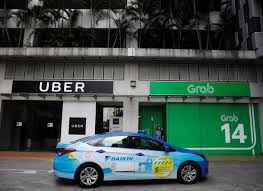When the Government and its Ministers and Wives Are in Business, Business Comes First Not Consumers
State-owned ( but actually Ho Ching-controlled) CNA reported yesterday on a new Bill (the Point-to-Point (P2P) Passenger Transport Industry Bill) tabled in Parliament to regulate the private car-hire industry.
I was immediately struck by a sentence near the end of the report which said that LTA intended to regulate not only the operators but the fares they could charge. According to LTA, this was to prevent operators from artificially lowering prices to gain market share.
Regulating prices when there is a natural monopoly created by economies of scale or high barriers to entry may be necessary. This is typically the case for utilities like water or power generation though even in these cases there is more scope for competition than may be immediately obvious. In any case the regulator normally seeks to prevent companies raising prices by for instance setting a price cap.
It is difficult to see why the LTA and the Competition Commission of Singapore (CCS) would want to prevent operators from lowering prices. In a competitive market firms lower prices to gain market share. They are able to do so because they are able to gain an efficiency edge over their rivals through innovation and productivity gains. LTA now wants to prevent this from happening.
However their ostensible rationale for doing so is suspect. A company may attempt to gain a monopoly by lowering prices, making its competitors unable to earn a profit and driving them out of business. It may be able to do so because it has deep-pocketed shareholders who are willing to absorb the short-term pain or because it is more efficient. However if it then raises prices it risks new entrants to the market. Where barriers to entry are low then a seeming monopolist with a very high market share may not actually have that much pricing power because any price rises will within a short space of time lead to new competitors and an erosion of market share.
This is probably the case with the ride-hailing industry. Though Uber initially had very high market shares this quickly attracted local competitors in markets like China and India. In China Uber eventually ended up selling out and taking an equity stake in its competitor. Despite its retreat it is still not profitable and faces new competitors in its major markets such as the UK as well as EU restrictions driven more by a desire to hobble American tech firms in favour of local ones.
As Singaporeans are aware Uber also sold out in Singapore in the face of competition from Temasek and Softbank-backed competitor Grab. The CCS made a feeble attempt to prevent the merger but the companies treated them with contempt and went ahead. As a result of the loss of competition both riders and drivers have suffered as the merged entity has a near-monopoly. It is not clear whether the Indonesian ride-hailing firm Go-Jek can be an effective competitor.
So the LTA regulations seem aimed more at ensuring that there will be little or no competition for Grab and the taxi operators, most of which are either Government or PAP-owned (through NTUC). Uber’s retreat has been bad for consumers in Singapore and the new regulations will make it worse. Singaporeans will end up with the usual oligopoly with the hidden hand of the Government so as to maximise prices and profits for the companies it owns or for the PAP-associated companies like Comfort Delgro which has several ex-PAP MPs and connected parties on its board.
We do not know how much Temasek owns of Grab but clearly it has a vested interest in maximising its profit and thus boosting its share price prior to flotation. We also do not know who the other shareholders are though it seems reasonable to suspect that well-connected members of the PAP elite may have been early investors. Though the Government refuses to disclose how much or under what formula Ho Ching is paid maximising the value of Grab and shoring up the profits of the taxi operator (SMRT) it owns would boost the profits of Temasek and it is safe to assume would increase Ho Ching’s earnings.
So forgive me for my cynicism if I suspect that the LTA, like other Government agencies, is not motivated primarily by the welfare of Singaporeans but by the interests of Government or PAP-controlled companies and, indirectly, the members of the PAP elite who have appointed themselves to run them. And at the top sits the PM’s wife. Lets only hope that one day we can clear the fog of disinformation and fakery that the Lee family have erected. My dad was fond of wearing a T-shirt which said: “And ye shall know the truth and the truth shall set you free” (John 8 v.23):

(Coincidentally those words are the unofficial motto of the CIA and inscribed into the wall at CIA HQ at Langley.) Hopefully Singaporeans will not have to wait till the end of the world to know the truth even though it feels as though the PAP will still be in office then and a member of the Lee dynasty sitting on the throne.





Rather cruel of them to want to make consumers pay more; many people use grab N gojek to go to work or go to clinics;
Kenneth last time you mentioned you invited HENG pm in waiting for dinner at yr college in uk,why on earth do you do that ?if I were u I would hv kept money n gotten something nice for myself; you are there on fathers scholarship or yr own steam whilst scholars are there on Govt scholarships with nice jobs waiting for them ; it’s throwing good money to undeserving people
Look Fwd to yr answer ; frankly I would not hv spent one penny on them
LikeLike
Kenneth
Didn’t the Goh (the 1st development minister) give a speech pointing out that mostv3rd world countries are poor because the politicians and civil servants think they”re businessmen?
Perhaps the elites might remember that whenever they pontificate about business and jobs
LikeLike